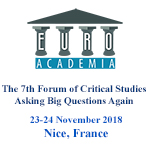Euroacademia Conferences
 Europe Inside-Out: Europe and Europeanness Exposed to Plural Observers (9th Edition) April 24 - 25, 2020
Europe Inside-Out: Europe and Europeanness Exposed to Plural Observers (9th Edition) April 24 - 25, 2020 Identities and Identifications: Politicized Uses of Collective Identities (9th Edition) June 12 - 13, 2020
Identities and Identifications: Politicized Uses of Collective Identities (9th Edition) June 12 - 13, 2020 8th Forum of Critical Studies: Asking Big Questions Again January 24 - 25, 2020
8th Forum of Critical Studies: Asking Big Questions Again January 24 - 25, 2020 Re-Inventing Eastern Europe (7th Edition) December 13 - 14, 2019
Re-Inventing Eastern Europe (7th Edition) December 13 - 14, 2019 The European Union and the Politicization of Europe (8th Edition) October 25 - 26, 2019
The European Union and the Politicization of Europe (8th Edition) October 25 - 26, 2019 Identities and Identifications: Politicized Uses of Collective Identities (8th Edition) June 28 - 29, 2019
Identities and Identifications: Politicized Uses of Collective Identities (8th Edition) June 28 - 29, 2019 The European Union and the Politicization of Europe (7th Edition) January 25 - 26, 2019
The European Union and the Politicization of Europe (7th Edition) January 25 - 26, 2019 7th Forum of Critical Studies: Asking Big Questions Again November 23 - 24, 2018
7th Forum of Critical Studies: Asking Big Questions Again November 23 - 24, 2018 Europe Inside-Out: Europe and Europeanness Exposed to Plural Observers (8th Edition) September 28 - 30, 2018
Europe Inside-Out: Europe and Europeanness Exposed to Plural Observers (8th Edition) September 28 - 30, 2018 Identities and Identifications: Politicized Uses of Collective Identities (7th Edition) June 14 - 15, 2018
Identities and Identifications: Politicized Uses of Collective Identities (7th Edition) June 14 - 15, 2018
In the Space of the Screen: Cinema and the Political Subject
-
-

-
Presentation speakers
- Evelyn Preuss, Yale University, USA
Abstract:
Hollywood manufactures potent mind-altering drugs. Activating a hormonal response in its subjects, their effects are no less physical than conventional chemically-based psychopharmaca. As Hollywood’s recipe of combining image and sound to captivate audiences proliferates, mutates into other forms and is adopted by new media industries—first television, then video game ventures and now internet streaming services—its availability has spread from the once-a-week delivery of the ‘night at the movies’ to an exposure that extends through much or most of people’s unstructured time. Digital technologies further enhance both the effectiveness and the distribution of the drug, enabling a more or less continuous hallucination and mind control. Changing expectations and behavioral patterns, Hollywood and its mutants reconfigure emotional and mental structures, undermining not only concepts of personal autonomy, but, in its wake, also of the liberal political subject and democracy. My paper juxtaposes the Hollywood aesthetic, which after the demise of the Eastern bloc has become globally dominant, with that of media from the former East. Using East German Cinema as an example to show how media could function as an intersection of studio-produced Autorenfilm with a revolutionary intent (i.e., as a cross-over of what is conceived in film theory as First, Second and Third Cinema), I will highlight an aesthetic that instead of a compulsive and addictive lack-suture structure, an overpowering affective control and a return-to-the-comfort-zone closure, aimed to liberate the spectator intellectually and emotionally, sought to interpolate the spectator as an autonomous subject and to use the movie hall as a social forum in which to establish a democratic consensus. Instead of hijacking the spectators’ minds by triggering emotive responses, East German cinema first and foremost called upon the intellectual capacity of the audience. It eschewed unequivocality, instead using the screen to open up a space for questioning and contemplation.
-
Related Presentations













